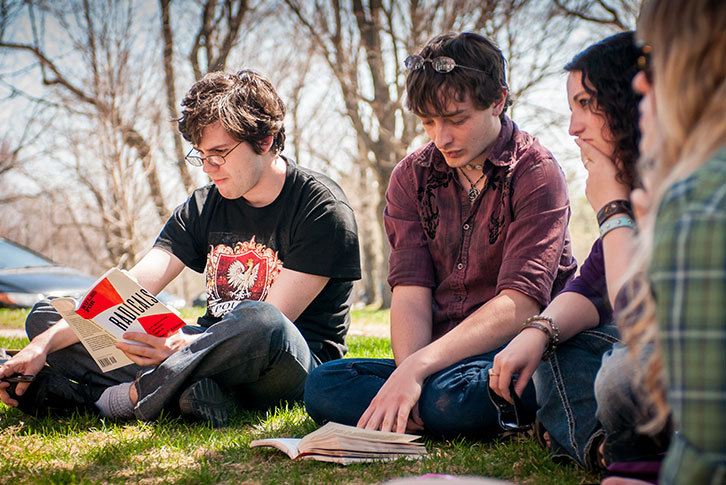Aaron Records '15 majored in philosophy and creative writing and spent a year after graduating as the Presidential Fellow for College Communications before enrolling at Syracuse University College of Law. This summer, he is working for the Hon. Thomas J. McAvoy, senior judge for the United States District Court for the Northern District of New York, at his Binghamton chambers.
Associate Professor of Humanities Ewa Chrusciel interviewed Records about the hallmarks of his undergraduate education and how Colby-Sawyer prepared him for law school. In addition to offering a pre-law track, the college’s new crime and legal studies major provides a solid understanding of political and legal systems, which students may apply to a career in law enforcement, corrections, parole, probation or social services areas.
How has your course work in the Humanities Department, especially within your major, impacted you?
My interest in law was piqued by a class taught by Professor Craig Greenman: Social and Political Philosophy. It was the first time I read John Rawls's work, and as we contemplated theories such as the veil of ignorance, I began to wonder how philosophy worked in practice. Law and policy are where ideas hit the road. Law school seemed the logical choice, then, to learn about such applications.

At Colby-Sawyer, I was immersed in the humanities, and my writing skills have helped me get as far as I've come. Though the writing in law school is different from creative writing, a strong familiarity with the writing process is adaptable to almost any type of writing. The critical thinking a liberal arts education provides has also proven invaluable.
Law schools employ the Socratic method, which means professors call on a random student in class who is then peppered with questions. Often the professor will ask if the court ruled correctly, and why or why not. When the spotlight is on you with 80 or more peers watching, it helps to be comfortable with questions that, more often that not, don't have a 'right' answer. Thankfully, I have Socrates and other great thinkers to help me evaluate the tough questions.
You wrote a strong paper on novelist Joseph Conrad in my class entitled “Achebe’s Weakest Link: an Analysis,” which was published in an international scholarly journal: Yearbook of Conrad Studies. Can you tell us a bit about the opportunities that publication yielded?
I was surprised when the Joseph Conrad Research Center liked my essay enough to publish it. When they invited me to talk at Jagiellonian University in Krakow, Poland, I was at a loss for words. It was because of your help that the essay was published in the first place. I had written the essay for your World Literature course, and you were the one who passed it along to Jolanta Dudek, director of the research center.
That paper, and the generosity of the college and the Wesson Honors Program, allowed me to make my first trip to Europe. I—like many Colby-Sawyer students—am a first-generation college student, so without financial help from the college, I would not have been able to afford to travel to Krakow. That experience abroad, combined with my semester in China, opened my mind to global opportunities. My worldview now incorporates more than just New England, or even the United States.
While in Poland, I visited Auschwitz to see what happens when the wrong political philosophy is implemented. It's a dark mirror of a memory I look to whenever I need to rediscover my own humanity.
Tell us about your graduate studies.
This was my first year in law school. I have two more years to go, and then the choice of in which state—likely New York or New Hampshire—to take the bar. The work load as a law student is significantly higher than as an undergraduate, but if you work hard, success is attainable.
The first year of law school is almost the same everywhere. You take the fundamental law courses, like contracts, criminal law, and civil procedure. The second year you get to pick and choose most of your courses to suit your interests. I was surprised by my interest in property law last spring, and so I am taking more courses related to a career in probate law in the fall. During this summer working for Judge McAvoy, I hope to gain a stronger sense of what kind of law I want to practice, but for now I am interested in a career in wills and trusts.
I spent most of my free time this year doing pro bono work for the Syrian Accountability Project. We compile events within Syria's borders, which are likely war crimes into both a narrative and a matrix for use by the United Nation's Independent Mechanism. The hope is that one day a special prosecutor will be able to use the documents to bring justice against the Syrian regime. I am also a co-chair on the Pro Bono Advisory Board, which helps law students find pro bono opportunities and with civil service programs at the law school.